On the morning of 15 June, more than 400 young people from the Central African Republic (CAR) gathered with great anticipation for the opening session of a long-awaited youth conference. It was the last in a series of 114 that were held in selected cities around the world.
This conference, like the 113 others, was originally planned for 2013. But in March of that year, Bangui, the capital city of CAR, was engulfed by waves of violence that swept across the country. The security situation was too volatile to allow the conference to take place.
Over the course of the intervening months, the Baha'i community sought ways to enhance its contributions to peace in the country, largely through educational endeavors and efforts to build bridges with groups working for social harmony. The youth waited patiently for another opportunity to hold the conference.
When the announcement was made that the conference was indeed happening from 15 to 17 June, the news generated tremendous enthusiasm not only in the country but abroad.
In the opening session—covered by Television Centrafricaine, Radio Centrafrique, and Radio Notre Dame—participants were greeted with a letter addressed to them by the Universal House of Justice.
"Nearly two years have passed since over 80,000 of your peers gathered in historic conferences across the world that we called for in our message of 8 February 2013," the message stated.
"Conditions in the Central African Republic during the period that the conferences were being convened prevented you from holding your own gathering and engaging together in the conversation that so inspired the hearts and illumined the thoughts of your contemporaries elsewhere," it continued. "We are delighted that you too now have the opportunity to meet and deliberate in a similar manner.
"Your discussions will no doubt assist you to sharpen your vision of a spiritually and materially prosperous society, one which you can help to bring about through your words and actions. You must, in this light, hold firm to the conviction that the progress and happiness of each one of you is inextricably intertwined with the progress and happiness of your communities."
The gathering provided a space for young people to reflect on their place in the world. They studied materials prepared for the conference together in small and large groups and committed themselves to working for the betterment of their communities, a goal all the more laudable when set against the backdrop of sectarian conflict and suffering that afflicts their country at this time.
Over the three days, those who attended discussed a number of themes, including the characteristics of the period of youth and the distinct role their age group can play in bringing about constructive social change; what it means for society to advance both materially and spiritually; how to foster an environment of mutual support in which the contributions of all who wish to work for the common good are welcomed; and the importance of assisting the younger generation to navigate early adolescence, helping them to avoid the effects of destructive social forces.
Such enthusiasm was generated in the groups that some wanted to plan straight away what paths of service to their community they would pursue after the conference, explained Mr. Zowé Tiba Nganyadé, one of the organizers.
In reflecting on the preparations for the conference, Mr. Nganyadé explained, "It is a major logistical challenge to host such an event in a country where the infrastructure has been destroyed, where water and electricity have become rare commodities."
Yet, amid those conditions, the announcement of the conference "generated such excitement that even young people living in the zones still under rebel control expressed their desire to attend", although many could not travel to the conference due to the unstable circumstances in the country.
"Some traveled a week to make it," said Mr. Nganyadé.
With the closing session, the conference brought to conclusion the series of youth conferences called for by the Universal House of Justice in 2013.
Return to top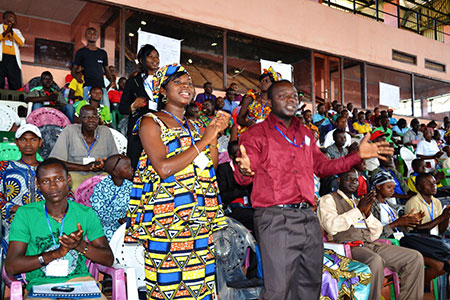
Participants look on during one of the musical performances.

The conference comprised more than 400 young people. Many others could not participate due to the volatile situation in the country.
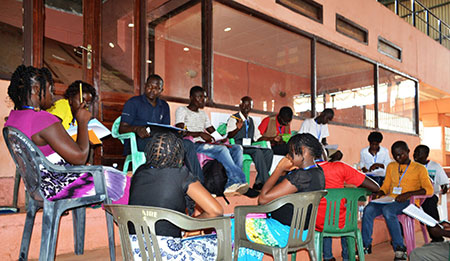
Participants study the conference materials and consult in a small group session.
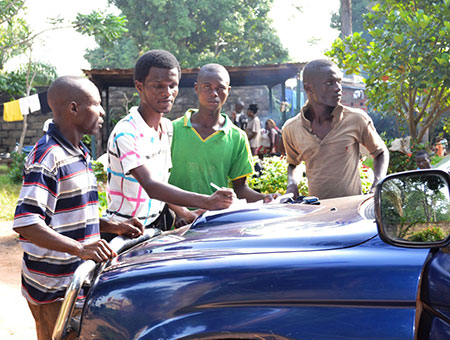
Participants make plans for how to serve their communities when they return from the conference.
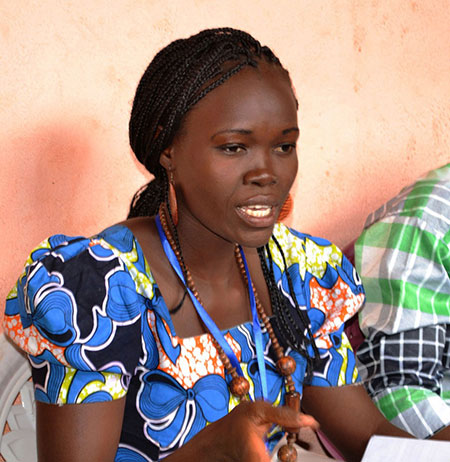
A participant contributes to the conversation in a small group session.
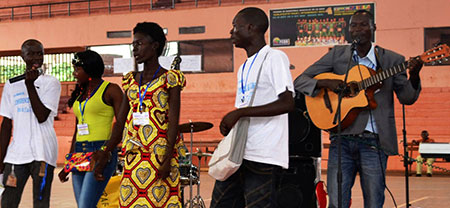
The arts played a significant role in the conference. These youth prepared a musical piece to convey aspects of what they were learning together.